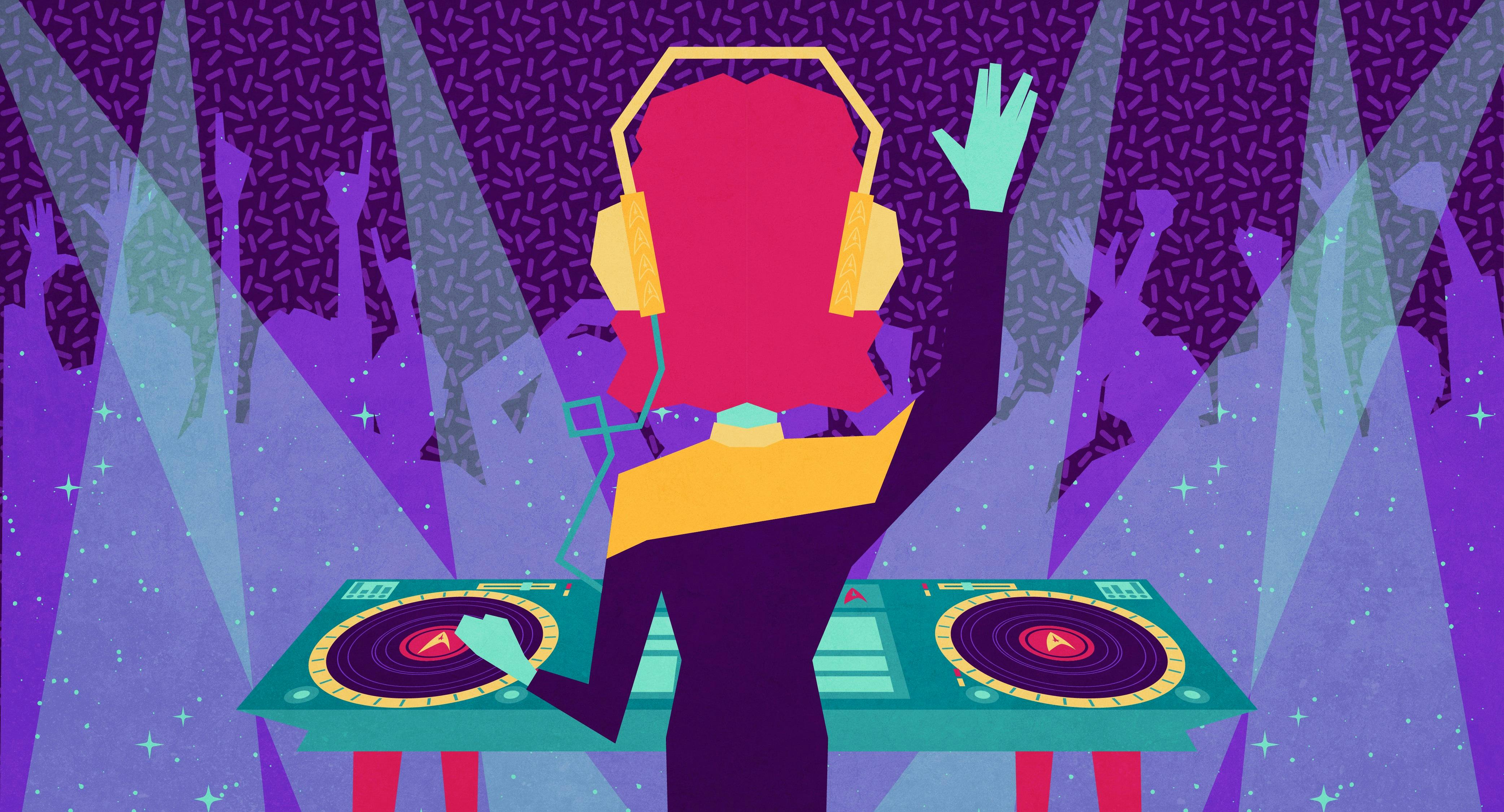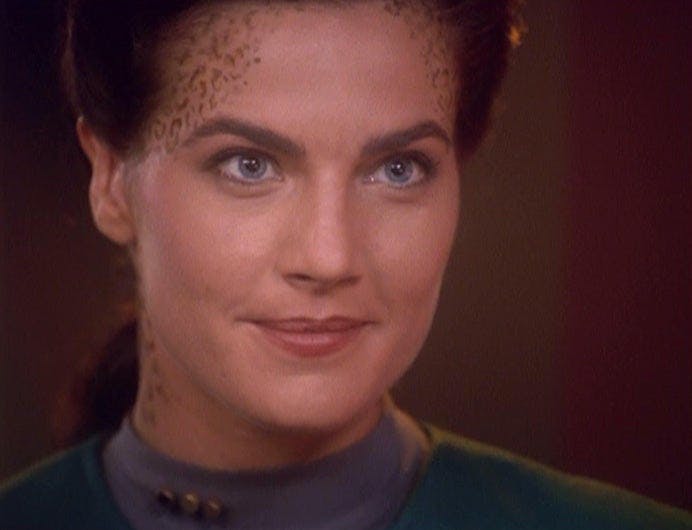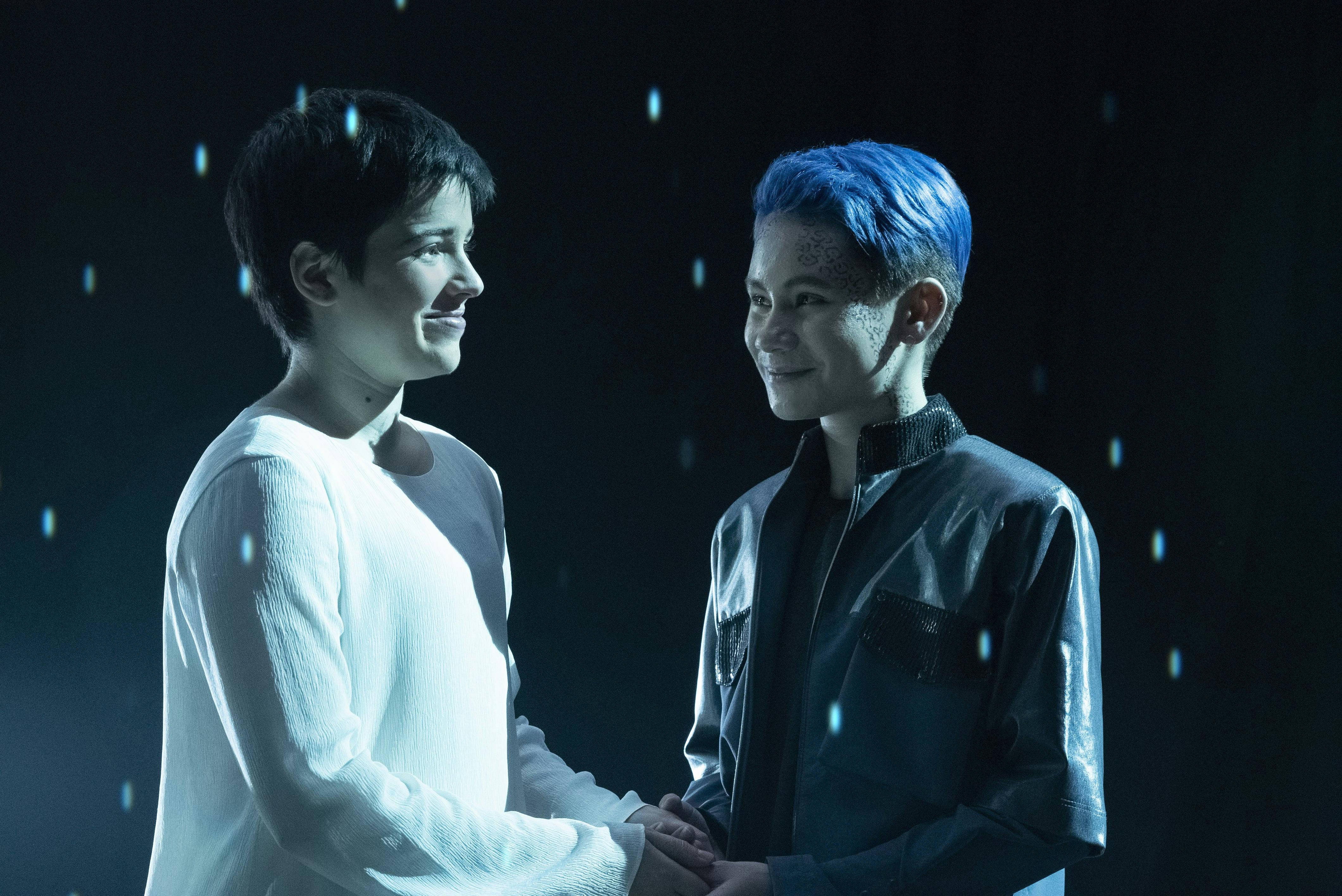Published Oct 11, 2021
Coming Out to My Star Trek Family
One fan talks about the way Star Trek fandom helped her feel safe and seen as her full self.

StarTrek.com / Rob DeHart
This article was originally published on March 31, 2021.
In October 2012, I stepped into a room full of people who'd known me for years, but most of them were about to truly meet me for the first time. I was scared out of my mind. At a science-fiction convention in Chicago, they were busy turning a hotel suite into a tiny nightclub, and I had arrived to step up my DJ gear, a now-familiar ritual. Only this time, I was wearing a full face of makeup and a dress… and an announcement needed to be made. I had new pronouns. And a new name. This was not some ultra-liberal organization of party throwers, either. It's an organization known as Barfleet, whose only real ethos is "throw the best, safest convention parties". And I was about to their first out, visibly transgender member.
It can be a bit hard to describe Barfleet if you've never met us, or been to one of our parties. For folks who've never been to a science-fiction convention, the concept of a "convention party" already sounds almost ludicrously anachronistic. And if you don't have much experience with organized convention party groups, walking into a hotel suite with a fully-functioning bar, DJ with full sound and lights, and a packed dance floor is still a bit of a headtrip. We are, without a doubt, a Star Trek fan group. Our organization has a Trek pun for a name, our chapters are organized as "ships", and our members all have ranks and pseudonyms. But, we eschew the wool uniforms for bathrobes, Hawaiian shirts, and other more comfortable or fetching partywear. And we rarely take anything seriously besides the safety of our party guests and having a really good time.
After the announcement of my new name and pronouns was made, there was zero fuss made. I got hugs from my friends, and then they told me to get my ass to work because we had a party to throw. It all felt pretty anticlimactic for the build-up. This was the first large friend-group I had come out to, and while I had laid some groundwork with close friends ahead of time, I was fully prepared for things to get really awkward. I remember thinking to myself, "Wait, is it really that easy?"
Back in Michigan, the science-fiction/fantasy convention community had been my safe space to figure out how to be the real me. I think if you asked most people to list off the safest places for someone to take some of their earliest steps out of the closet as a trans woman, "science-fiction convention" would rank in the same vicinity as "construction site" and "conservative America." The convention community has a not-entirely-unearned reputation dominated by straight white men eager to hang a "no girls allowed" sign on the door, especially to those who may not have much real-world experience with con-culture. Yet, it's precisely in the altered reality of the Michigan fannish world of the late 00s that I found a space where I could pass through my gawky adolescent stage of transition with relatively little consequence. When I do panels about being trans in fandom, I will often joke that a somewhat-masculine girl who hasn't quite figured out eyeliner ranks pretty low on the list of weird stuff you'll see on an average convention day.

StarTrek.com
Before Barfleet opened the doors of our party that night, our staff gathered for a pre-meeting to run down our general order, to meet new people, and to get everyone on the same page for the evening. Standing quietly in the corner, when the time came to introduce myself with my in-group character/pseudonym, I was swiftly cut off. Our then-Fleet Captain hushed the large gathered crowd and noted that my appearance had changed rather dramatically since they had last seen me. He explained that my previous "host" had died, and my Symbiont had been joined to a new, happier female host, and gave me a new name to reflect my gender identity. I got wild cheer from the room, and I've never once been called by the wrong name since.
In the first few months, I got some curious questions. I had folks who didn't really "get it", but didn't see any reason to make a fuss because no one else seemed to. But mostly, they all just made the shift like it was the sort of thing that happens every day. Several command staff privately made it clear to me that absolutely no intolerant nonsense would be accepted, and anyone who made me the slightest bit uncomfortable — be it crew or party-goer — would be swifty corrected. When I asked why they'd go to such effort for me, there wasn't any explanation more complicated than, "because you're part of our crew, and we take care of our crewmates."
---
A lot has changed in the world in the nearly nine years since that October weekend. Transgender narratives, characters, and performers are routinely seen on screen and found in fiction as more than mere victims of tragedy or spectacles for ridicule. Time Magazine declared 2014 the "tipping point" in trans visibility, and that's become a self-fulfilling prophecy. Resources and information are available in ways barely conceivable just a decade ago. It is also an altogether scarier world for transgender people, with heightened awareness of our existence bringing us into sharp focus as a political wedge and as boogey-people for those seeking to drum up convenient fear.
A lot has changed for me as well. I've grown into myself, built a career as a writer and educator, and become comfortable in my own skin — much to the chagrin of some. While I was very fortunate to deal with little outright rejection when I transitioned, I wasn't prepared for how my growth and evolution as a person would end up alienating me from people and groups that viewed themselves as progressives and allies. These days, I can also pick and choose when to make my transness known, and when to keep it to myself for the sake of my safety or comfort.

StarTrek.com
What really has not changed is my place in Barfleet — aside from somehow rising from Ensign to Commander. I continue to stand boldly, brightly, and loudly in front of our parties, unflinchingly visible in my transness and in my authenticity because I know that I am safe, loved, and supported. I'm now far from the only trans person in Barfleet, which makes me enormously happy. And I continue to work hard to make sure that our organization and our parties are places where trans people can be their whole visible selves, whether they're already out when they join us, or come out later on. At DetCon1 (where I will proudly brag I was named Best Entertainment), we got a callout in Huffington Post for my visibility and our welcoming environment standing in stark contrast to the parties of the progressive Netroots Nations conference in the same hotel.
Gene Roddenberry's vision for Star Trek is one of fundamental optimism about humanity, its potential, and its future. While I'm not sure if Gene imagined a miniature Star Trek themed bar crammed into a hotel room, I would like to think he'd love that the space inside is one where a ragtag band of fans hold space for everyone to be loudly, visibly their whole selves, even if the rest of world is dragging its heels in getting there.
Mari Brighe (she/her) is a freelance cultural & political commentary writer, editor, and speaker focusing on gender and sexuality. She has appeared in over a dozen publications, on NPR and The Daily Show with Trevor Noah, and at numerous professional conferences and SF/F conventions.

